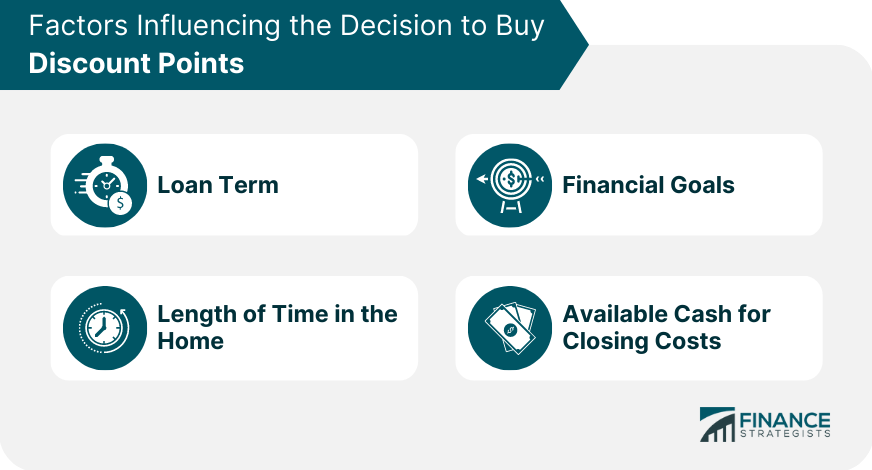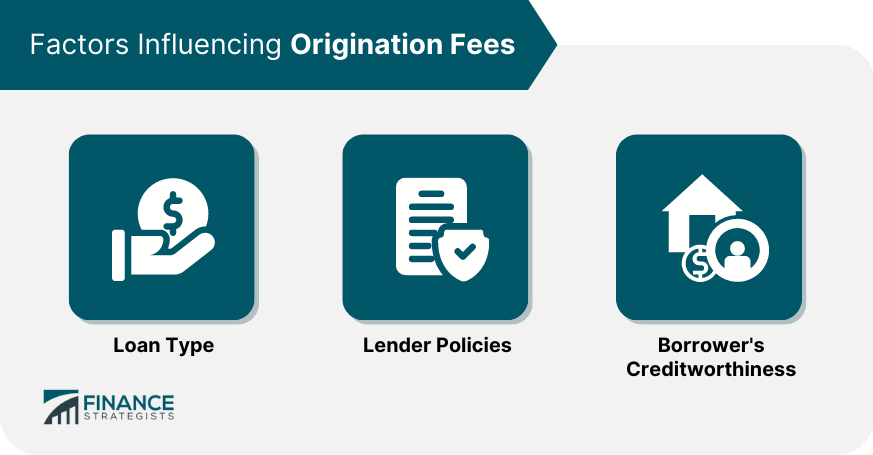Mortgage points and origination fees are charges that borrowers may encounter when applying for a mortgage loan. Mortgage points are fees paid upfront to lower the interest rate, while lenders charge origination fees to cover processing costs. There are two types of mortgage points: discount points and origination points. Mortgage points, also known as discount points, are fees paid to the lender at closing in exchange for a reduced interest rate on the mortgage. This section will explain the purpose of discount points, factors to consider when deciding to buy them, how to calculate the break-even point, and tax implications. Discount points are essentially prepaid interest on the loan. The borrower can lower the interest rate by paying for these points upfront, resulting in reduced monthly mortgage payments. When deciding whether to buy discount points, consider the following factors: Loan Term: The longer the loan term, the more beneficial discount points may be. Length of Time in the Home: If you plan to stay in the home long enough to reach the break-even point, discount points may be worth considering. Financial Goals: Determine whether the upfront cost aligns with your financial objectives. Available Cash for Closing Costs: Ensure you have enough funds to cover the costs of discount points and other closing fees. The break-even point is the moment when the savings on monthly payments equal the cost of the discount points. To calculate the break-even point, follow these steps: Discount points may be tax-deductible as mortgage interest, subject to IRS requirements and limitations. Consult a tax professional to determine your eligibility for deductions. The lender charges origination fees to cover administrative costs associated with processing the loan. This section will discuss the factors influencing origination fees and tips for negotiating these fees. Origination fees compensate the lender for processing, underwriting, and funding the loan. These fees may be a percentage of the loan amount or a flat fee. Origination fees can vary depending on: Loan Type: Different loan products may have varying origination fees. Lender Policies: Each lender has its own fee structure. Borrower's Creditworthiness: Applicants with better credit may be able to negotiate lower fees. To negotiate origination fees, consider the following tips: Shop Around for Lenders: Compare fees from multiple lenders. Compare Loan Estimates: Review Loan Estimates provided by each lender to compare fees and terms. Negotiate: Discuss with lenders the possibility of lowering fees based on your creditworthiness or other factors. Mortgage points and origination fees can affect the Annual Percentage Rate (APR), which represents the total cost of the loan, including interest and fees. Balancing lower interest rates with upfront costs is essential for evaluating the total cost of the loan. To make an informed decision about whether to pay for discount points or origination fees, consider the following: Assess personal financial goals and circumstances. Calculate potential savings from mortgage points. Determine the break-even point to decide if purchasing discount points is worthwhile. Evaluate the trade-offs between lower interest rates and upfront costs. Consult with financial advisors or mortgage professionals for personalized guidance. In addition to understanding mortgage points and origination fees, exploring other strategies for reducing mortgage costs is important. This section will discuss options like refinancing, government-backed loan programs, and lender credits. Refinancing a mortgage can help reduce the interest rate and monthly payments, which may result in significant long-term savings. Evaluate current market conditions and interest rates to determine whether refinancing is suitable. Various government-backed loan programs, such as FHA, VA, and USDA loans, can help borrowers secure more favorable interest rates and terms. These programs often have lower down payment requirements and more flexible credit standards, making homeownership more accessible. Lender credits are an arrangement in which the lender agrees to cover some or all of the borrower's closing costs in exchange for a higher interest rate. This can reduce the upfront costs associated with obtaining a mortgage. However, carefully weigh the long-term implications of a higher interest rate against the immediate savings on closing costs. By considering these strategies, potential borrowers can further reduce their mortgage costs and make homeownership more affordable. Understanding mortgage points, origination fees, and various strategies for reducing mortgage costs is crucial for potential borrowers navigating the home-buying process. By examining the purpose, factors, and implications of discount points and origination fees, borrowers can make informed decisions about whether to pay for these costs. Additionally, exploring options such as refinancing, government-backed loan programs, and lender credits can further help reduce mortgage costs and make homeownership more affordable. Remember to assess personal financial goals and circumstances, calculate potential savings, weigh the trade-offs between lower interest rates and upfront costs, and consult with professionals when making these important financial decisions. By doing so, borrowers can secure the most advantageous mortgage terms and ultimately achieve their homeownership goals.What Are Mortgage Points and Origination Fees?
Mortgage Points
Definition and Purpose of Discount Points
Factors Influencing the Decision to Buy Discount Points

Calculating the Break-Even Point
1. Determine the difference in monthly payments with and without discount points.
2. Divide the cost of the discount points by the monthly savings.
3. The result represents the number of months it will take to recoup the cost of the discount points.Tax Implications of Discount Points
Origination Fees
Definition and Purpose of Origination Fees
Factors Influencing Origination Fees

Negotiating Origination Fees
Understanding the Relationship Between Mortgage Points and Origination Fees
Making an Informed Decision
Strategies for Reducing Mortgage Costs
Refinancing
Government-Backed Loan Programs
Lender Credits
Conclusion
Mortgage Points and Origination Fees FAQs
Mortgage points, also known as discount points, are fees paid upfront by the borrower to reduce the interest rate on their mortgage loan. Each point typically costs 1% of the loan amount and can lower the interest rate by 0.25% to 0.5%.
The purpose of paying mortgage points is to lower the interest rate on a mortgage loan, which can lead to lower monthly payments and potentially save the borrower thousands of dollars in interest over the life of the loan.
Origination fees are charges levied by a lender to cover the costs of processing a mortgage loan application. These fees can include underwriting, document preparation, and administrative costs. Origination fees are typically a percentage of the loan amount, ranging from 0.5% to 1%.
Yes, origination fees can be negotiated with the lender. Borrowers can ask for a breakdown of the fees and negotiate the amount charged for each service. Some lenders may be willing to waive or reduce certain fees, especially if the borrower has a strong credit score or borrows a large amount.
Mortgage points and origination fees may be tax deductible in certain circumstances. The borrower can deduct the points and fees if they were paid to obtain a mortgage to buy or improve a primary residence or second home. However, the borrower must itemize their deductions on their tax return to claim the deduction. It's best to consult a tax professional for specific guidance on deducting mortgage-related expenses.
True Tamplin is a published author, public speaker, CEO of UpDigital, and founder of Finance Strategists.
True is a Certified Educator in Personal Finance (CEPF®), author of The Handy Financial Ratios Guide, a member of the Society for Advancing Business Editing and Writing, contributes to his financial education site, Finance Strategists, and has spoken to various financial communities such as the CFA Institute, as well as university students like his Alma mater, Biola University, where he received a bachelor of science in business and data analytics.
To learn more about True, visit his personal website or view his author profiles on Amazon, Nasdaq and Forbes.











